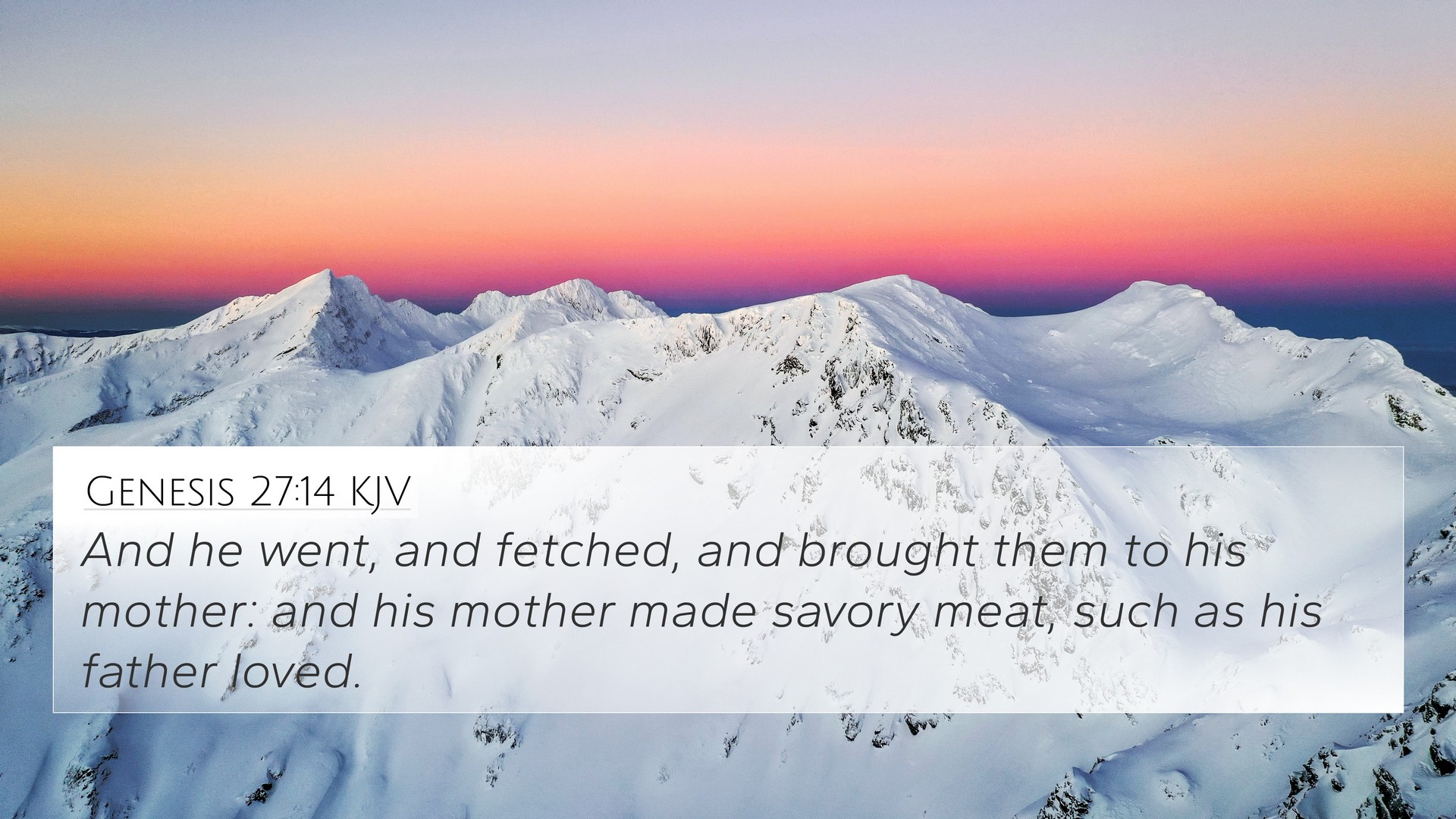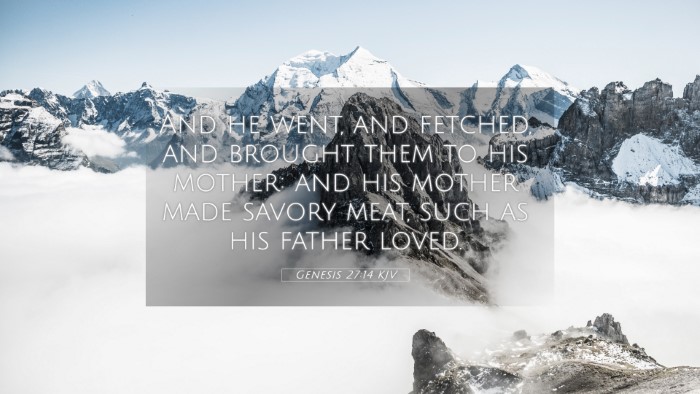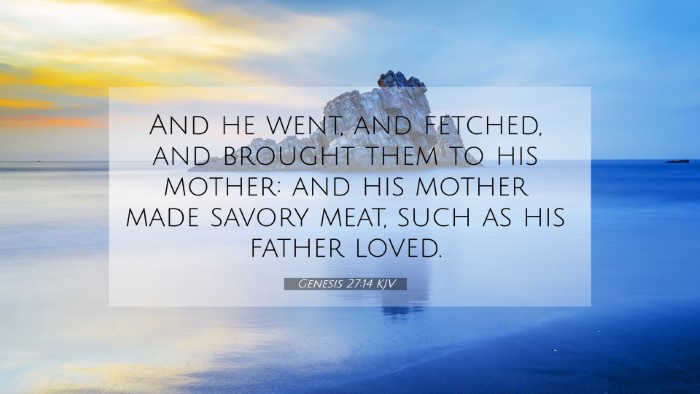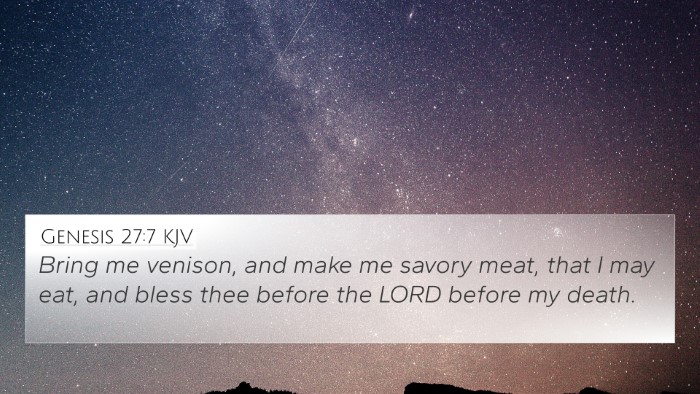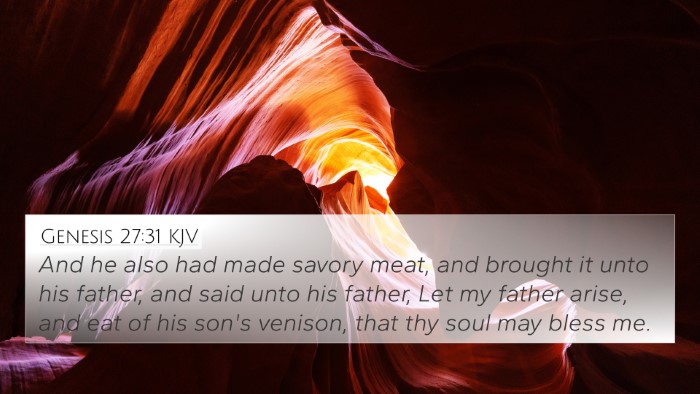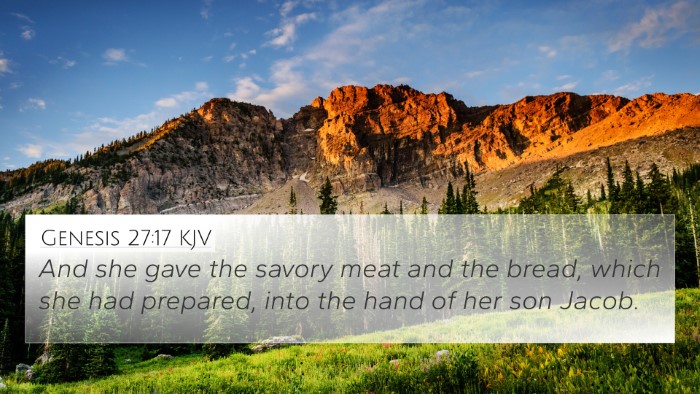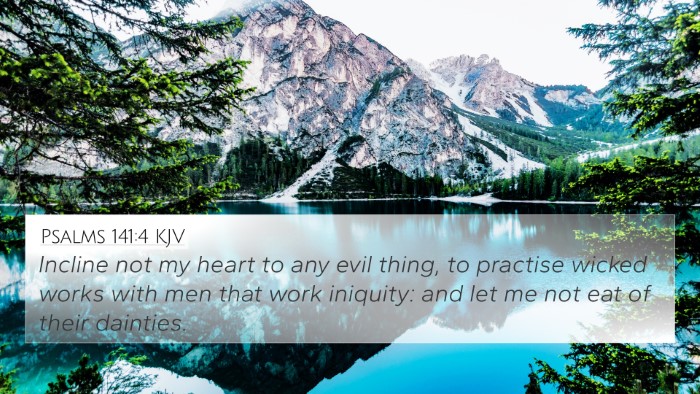Understanding Genesis 27:14
Genesis 27:14: "And he went, and fetched, and brought them to his mother: and his mother made savoury meat, such as his father loved."
Context and Background
This verse is located within the narrative of Isaac's family, where significant events unfold around the blessing of Isaac. Jacob, under his mother Rebekah's guidance, seeks to receive the blessing intended for his brother Esau. This backdrop serves to illustrate the complexities of familial relations and the pursuit of blessings in a biblical context.
Commentary Insights
Based on insights from Matthew Henry, Albert Barnes, and Adam Clarke, we can glean several meanings from Genesis 27:14:
-
Deception and Ambition: Henry highlights the theme of deception as Jacob, encouraged by Rebekah, uses cunning to achieve his ends. This raises ethical questions about ambition and family dynamics.
-
Motherly Influence: Barnes points out the significant role Rebekah plays, demonstrating how parental influence can shape decisions and outcomes in our lives.
-
Cultural Practices: Clarke notes that the act of making savory meat was a cultural practice tied to securing favor, indicating how food was often used as a means to gain approval and blessings.
-
Spiritual Implication: This verse foreshadows later biblical themes where the chosen lineage of Abraham is solidified not through mere birthright but through divine purpose, as seen in Romans 9:10-13.
-
Human Agency and Divine Sovereignty: The actions of Rebekah and Jacob reflect human agency, which contrasts with God’s overarching sovereignty seen in His chosen plans for the lineage of Israel.
-
Conflict and Division: This episode highlights the conflict within the family and illustrates a broader theme of division that runs through the biblical narrative (Matthew 10:35).
-
Parental Relationships: The complicated relationships between parents and children are further explored through Jacob and Esau's relationship, echoing into future familial conflicts in the biblical text.
Cross-References
Genesis 27:14 connects with several other Bible verses that reflect its themes:
- Hebrews 12:16-17: Highlights the consequences of Esau's actions and the significance of the birthright.
- Romans 9:10-13: Discusses the divine choice of Jacob over Esau in God's sovereign plan.
- Proverbs 14:12: Suggests that there is a way that seems right but leads to death, reflecting Jacob's deception.
- Genesis 25:29-34: Details the earlier transaction between Jacob and Esau regarding the birthright.
- Luke 14:26: Jesus speaks of the priority of discipleship, resembling the preference Isaac shows for Esau.
- Matthew 10:35: Illustrates the division that can occur within families over spiritual matters.
- 1 Timothy 5:8: Addresses the importance of providing for family, reflecting the urgency of Rebekah's actions.
Thematic Connections
Genesis 27:14 can be related to various themes prevalent in the biblical narrative:
-
Divine Favor: The notion of who receives God's favor and how it often contradicts worldly expectations and norms.
-
Ethics and Morality: The ethical dilemmas presented through the actions of Jacob and Rebekah that challenge the moral framework found in scripture.
-
Familial Relations: The complexities of family dynamics, competition, and the consequences of deception and favoritism.
-
God's Plan: Understanding how God uses human actions—even flawed ones—to fulfill His purposes in history.
Understanding Through Cross-Referencing
The practice of cross-referencing Biblical texts is vital for deepening one's understanding of the Bible. It allows for a comprehensive grasp of how different passages relate to one another, fostering richer insights into both individual verses and overarching themes. Here are some useful tools and methods for cross-referencing:
- Utilizing a Bible concordance to identify key words and their occurrences across passages.
- Employing a Bible cross-reference guide to uncover related scriptures based on thematic connections.
- Practicing cross-reference Bible study by comparing passages that discuss similar ideas or narratives.
- Engaging with a Bible reference resource for a structured approach to linking scriptures.
- Exploring inter-Biblical dialogue through thematic Bible verse connections that illuminate the continuity of divine revelation.
Conclusion
The exploration of Genesis 27:14 reveals a tapestry of human emotion, divine intervention, and relational complexity. Through thorough analysis and cross-referencing with related Scriptures, we uncover deeper truths about the nature of God's plan and human responsibility, providing invaluable lessons for readers today.
